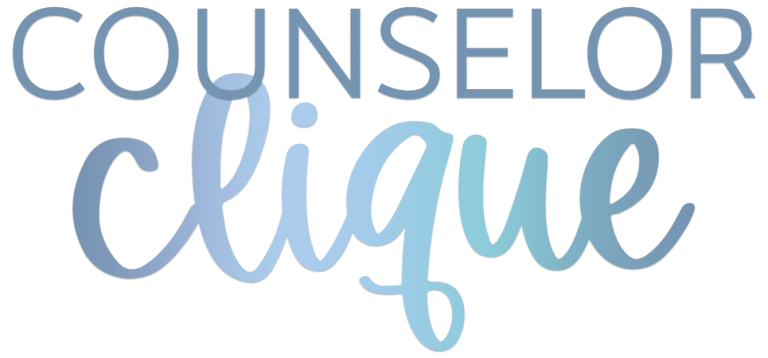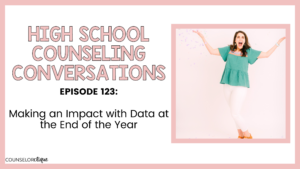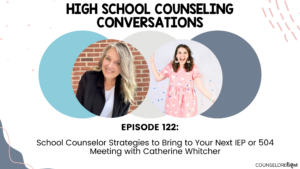
Here's What to Expect In This Episode:
Topics Covered in This Episode:
- The purpose and benefits of doing a time audit
- How a time audit helps you advocate for your role
- Why it’s helpful to do a time audit before creating your schedule
- The importance of having a crisis response protocol
- Tips for how to set up your crisis response team
Resources Mentioned in This Episode:
- Resource: CollegeVine AI Letter Recommendation Tool
- Resource: Rachel’s Impact Membership
- Resource: Rachel’s Stress-Free School Counseling Course
- Podcast: Episode 150 of School Counseling Simplified – How to Use a Time Audit to Streamline Your Schedule
- Leave your review for School Counseling Conversations on Apple Podcasts
Other Blog Posts You Might Like:
- Blog: When 10% of Your Students Require 90% of Your Time: 4 Ways to Better Manage Frequent Flyer Students
- Blog: 3 Easy Ways To Advocate for Your Time Without Rocking the Boat
- Blog: 4 Ways Time Management Can Be a Powerful High School Counseling Advocacy Tool
- Blog: Making Time for You: 4 Self-Care Tips for the Exhausted High School Counselor
- Podcast: Episode 44, Owning Your Time Management by Using Your Calendar
Meet Rachel Davis:
Rachel has nearly a decade of experience working as a school counselor at public, private, and charter schools in Southern California and most recently was the K-12 school counselor at an International School in Costa Rica! Currently, she is the counselor and curriculum designer behind Bright Futures Counseling with a top-rated school counseling podcast, School Counseling Simplified, and an engaged online community.
She writes a blog for school counselors and is passionate about helping school counselors increase their impact and advocate for their role. She resides in Costa Rica, and when she’s not working on her business you can find her at the beach playing with her family!
Connect with our Guest:
- Rachel’s Website
- Podcast: School Counseling Simplified
- Instagram @brightfuturescounseling
Read the transcript for this episode:
Lauren 0:08
You got into this profession to make a difference in your students lives, but you’re spread thin by all the things that keep getting added to your to do list. I can’t create more hours in the day, but I can invite you into my counselor clique where you’ll finally catch your breath. Come with me as we unpack creative ideas and effective strategies that will help you be the counselor who leaves a lifelong impact on your students. I’m Lauren Tingle your high school counseling hype girl here to help you energize your school counseling program and remind you of how much you love your job.
Lauren 0:40
There are certainly not enough hours in the day as a school counselor, and I know that you know that I can’t wave my magic wand and give you more hours in your day. Although that would be really nice, wouldn’t it?
Lauren 0:51
So I’m bringing in the big guns to give you a really neat strategy to make it feel like you’re getting more of your time back to do the things that matter the things that truly make an impact as a high school counselor.
Lauren 1:02
I want you to meet my friend Rachel Davis, the face behind Bright Futures counseling, and the host of the podcast school counseling simplified. Rachel is the school counseling and curriculum designer behind Bright Futures counseling. With nearly a decade of experience a highly rated school counseling podcast and an engaged online community.
Lauren 1:20
Rachel is passionate about helping school counselors increase their impact and advocate for their role. She resides in Costa Rica and when she’s not working on her business, you can find her at the beach playing with her two sons. This episode that I’m sharing with you today was originally recorded for her podcast school counseling simplified, but I asked her if we could share it over here on High School Counseling conversations, because I just thought it had a ton of relevance to those time crunched high school counselors as well.
Lauren 1:46
December is a great time to do a time audit to identify where your time is spent, and how you can use your time in the best way as possible. And Rachel is sharing with us how to do exactly this in this week’s episode. I hope you enjoy it as much as I did.
Rachel Davis 2:03
You’re listening to school counseling simplified a podcast with easy to implement strategies for busy school counselors. Here’s your host, Rachel Davis from Bright Futures counseling.
Rachel Davis 2:15
Thanks for listening to another episode of school counseling simplified. I wanted to talk about scheduling. Because this is something that I’ve had on my mind, because I keep getting asked about it. It’s a pain point for a lot of counselors. I know a lot of counselors struggle with this. Everyone is like I’m so good at helping the kids and you know, interpersonal connections. But when it comes to the strategy of planning and getting organized, and that like executive functioning base is a little harder for me.
Rachel Davis 2:42
So I feel that fortunately, I find that is one of my strengths. One of my gifts is that I love a good spreadsheet. And I’m pretty organized. So I like to share my methods that I’ve developed with counselors to help empower them so they can reach more kiddos than ever before and advocate for their position. So this week, I want to talk to you guys about a time audit.
Rachel Davis 3:04
So this is the first thing I recommend you do when you’re going to look at your schedule. So take a look at your schedule from last year. And I want you to do a time audit, I want you to think about how you’re spending your time. And I mean track everything. Or if you’re listening to this a little later, you could go ahead and do a real day in the life of a counselor if you’re working right now. Or if you want to just do like a mock day of what your day typically looks like.
Rachel Davis 3:32
So think about how you spend your time. You’re like, okay, I get to school, I do bus duty, and I greet with kids as they get off the bus. Then I sit at my desk and I check my email. And then usually someone pops in. And then I usually have a parent meeting. And then I have a 504 for meeting and then I do two small groups. And I have three lessons and I see some individual kiddos, then I try to eat lunch. Sometimes have a Lunch Bunch, all that, write it all down, okay.
Rachel Davis 3:54
And then you can see, I want you to color coordinate, I love color coordinating i’m very visual. Color coordinate and see just a quick divide. Which of these are direct student services, meaning you are directly working with a student through a class lesson, through a small group, through an individual session. And which of these is a support and service that’s indirect.
Rachel Davis 4:14
So these will be things like a meeting about a student, a planning session, things like that. So that’s a good way for you to look at the data. Now maybe you already have this data from last year, maybe you did my famous end of the year report. And you can look at from when you talk to your principal and see okay, I spent this many hours in sessions and I spent this many hours in planning and I spent this many hours in meetings, whatever.
Rachel Davis 4:40
If you have the data from last year, that’s excellent. If you don’t, that’s okay. You can again do like that mock day or just kind of get an idea of where you think you’re spending your time. This time audit is going to be super helpful. Because when you go to sit down with your principal at the start of the new school year and you’re going to plan you can advocate for your time and advocate for your kiddos.
Rachel Davis 4:59
And say Last year, I spent a lot of time doing this, I think it would support our students better if I could spend more time doing this, you know, aka I want to do more groups and less bus duty or whatever. But it really helps to have the numbers to back you up. So I hope you are collecting some data. If not, it’s okay, you can still kind of get an idea of where you’re spending your time.
Rachel Davis 5:19
If you’re brand new counselor, this is a really good place to start and intentionally set your time. So the time audit I’m referring to is for people who are already counselors, kind of looking at where you can improve how you’re spending your time. But if you’re a new counselor, this is perfect. Because you can get started intentionally knowing okay, I don’t want to spend time doing that.
Rachel Davis 5:39
And you know, chances are that you’re spending a lot of time in transition time. It’s so hard to switch between tasks, right? I don’t know the exact stat. But there’s something about so many seconds, it takes us to redirect after switching tasks. So think about you know, I’m so guilty of this having like a million tabs open on my computer. And I’m like answering an email. And then I’m like, Oh, but I want Spotify, then I change songs, I don’t like it anymore. Oh, and then a notification comes in over here, I go to Google something and then I forget about and I’ll have like a half drafted email.
Rachel Davis 6:08
If you can relate to that, then this will be super helpful for you. Same thing with you know, transition time at school, you’re walking to a class lesson after doing a small group and a teacher stops you in the hallway. And then you get distracted, and you have to do something else, or you come across a crisis. And you have to attend to that, you know, transition time or responding to crisis. Like I said, that’s definitely probably a place where you are spending your time, that you are like, I don’t have any time to do class lessons or small groups, because I’m always responding to crisis.
Rachel Davis 6:37
Or maybe meetings, maybe you’re spending a ton of time in meetings, and you don’t have time to do individual sessions. Or maybe you’re spending a lot of time communicating with parents, you’re always in a meeting or on a phone call or in your inbox, communicating with parents and teachers about kiddos rather than with the kiddos. So a time audit will help you identify these gaps, identify these deficits, and then you can move forward with a good plan.
Lauren 7:06
I want to introduce you to a new way to support your students. That’ll save you tons of time this college application season. Collegevine’s AI letter recommendation tool is about to change the game for the way you get your students letters completed. Collegevine has been around for 10 years, so they’ve had some time to perfect this tool. What makes it different from other AI generators. This one is programmed specifically with high school counselors in mind and knows the questions to ask you to get the right voice, the desired length of the recommendation letter, and the perfect personal touches to match your writing style. And the best part, it’s free. I promise you’re going to love experimenting with the way you write letters of recommendation from here on out, head over to counselorclique.com/collegevine to get started with this free tool today.
Rachel Davis 7:55
Now, one tip I have is a crisis response team protocol. Now this is something I love to help counselors develop as a means to respond to crisis because I know I think of my first year, I had a situation where this kid was like having a meltdown in the sandbox. And I had to go out there and help and then I missed my class lesson or I was late. And I was like running all sweaty, unprepared. And the teacher was just like, kind of rude honestly, like disgusted like at how unprofessional I was, how late I was and all her kids had just been waiting.
Rachel Davis 8:26
Which to her credit, like they shouldn’t have been waiting on me. Right? Like I should have been there. I had a commitment that I needed to honor. But at the same time, I’m like, No, I was like doing something counselor related. You know, that’s why I’m like, and then same thing, I was split between schools, I used to have a meeting at one school that would cause me to be late for my duty at the other school.
Rachel Davis 8:43
I always cutting it close it it was a morning duty. It was a pre school meeting, like before school meeting, not preschool. But the people were the one school who I did the duty with, they just thought I was running late every day, right? They didn’t realize I was coming to another school. So time management is real. You know, you want it to make you look good. You don’t want to appear that you’re flustered and all over the place. You want to be able to advocate for your role in your profession. And part of that is by being professional, being responsible and honoring your commitments to this class lessons.
Rachel Davis 9:13
And you may be thinking, Yes, I want to do that. But it’s really hard when there’s a crisis popping up all the time. So that’s why I like to introduce a crisis response team protocol. So what is a crisis response team protocol? Well, the protocol is basically if there’s a crisis, who’s going to respond to it, and how are they going to respond to it? And then it’s up to you to build your team.
Rachel Davis 9:37
So your crisis response team, I want you to think of other people in your building who can help when a crisis comes up. So typically, these are not going to be teachers. Typically, these are going to be people who have a schedule that’s pretty flexible. So maybe people like you, like the school psychologist, maybe even your secretary, maybe your vice principal. Maybe we even had a custodian on mine one time jump in the People with a specialty type role, who have a little more flexibility in their schedule. They are great members for the crisis response team.
Rachel Davis 10:08
So then you’re going to look at the calendar the day. And you’re going to say, Okay, I’m going to be on call basically from nine to 11. And then so and so is going to be on call from 11 to 12. And, and these can be as big or small chunks as you want them to be. And you might have two shifts, right. But this way you can build out your day, you can say, Okay, I’m going to schedule a class lessons, definitely not going to schedule them during that time, because that’s when I’m on call for crisis.
Rachel Davis 10:33
And you know, I hope you don’t have a lot of crisis, maybe there’s not a crisis for two weeks, that’s great. Instead, you have that chunk of time that you can do planning or, you know, logging your counseling visits. I’m sure there’s a million things on your to do list that you can do, you know, pop into some observations, pull in some kids that you want to check in with, do some minute meetings, I’m sure there’s lots of ways you can fill your time. So don’t worry about like being bored or being wasteful by chunking off his time.
Rachel Davis 10:58
But what it does is it allows you to be on call. So when there is a crisis, you know, you’re ready and you’re not missing anything else, or missing another commitment, because you’re ready to respond. And sometimes it’s not your turn, it’s someone else’s turn and they can step in and respond. So the kid with the crisis is always getting, you know, priority attention to de escalate that.
Rachel Davis 11:17
But at the same time, these other commitments aren’t slipping through the cracks. So you can feel more confident about scheduling consistent eight week sessions, or scheduling monthly classroom lessons, things like that. So I’m a big proponent of this, of course, it’s flawed. I mean, you know, there’s times when it’s not going to work out, but it’s better than what you’re doing now, likely, it’s better than not having any kind of plan, right. But it is flawed. And you know, sometimes there will be an individual student, if you have a relationship with that kiddo. Maybe it’s best for you to see them over someone else or vice versa.
Rachel Davis 11:49
I really encourage you to sit down with your administrator and try to get this kind of plan on the map, just color coded up, you know, I love colors, and say, okay, when you’re on call, this is your time, put it in your calendar. And then you can see and you know, if you have walkie talkies, or whatever, oh, crisis is happening, someone calls you and you’re like, Oh, I’m not on call, I’ll let the appropriate person know. And then of course, the protocols will you’ll develop with your team. So you will decide how you’re going to respond to the crisis.
Rachel Davis 12:16
Okay, guys, that is what I have for you guys for today’s episode. Like I said, this is a hot topic I’m constantly getting asked about. So I wanted to share on the podcast for everyone. And then I also wanted to gift it to my impact members. Because Module One of The Stress Free School counseling course is all about scheduling, we deep dive all of this stuff. And counselors find it really, really helpful when it comes to streamlining their schedule, all with the purpose of increasing their impact and getting the recognition that they deserve.
Rachel Davis 12:45
So if you’re interested in that join us and impact this month. I encourage you to think about your crisis response team protocol. Your homework is to think about and brainstorm five people who could potentially be on your crisis response team. Okay, talk to you next week.
Rachel Davis 12:59
Thanks for listening to school counseling simplified. You can find the links from today’s episode in the show notes. If you’d like to connect with Rachel, she’s on Instagram and teachers pay teacher’s @BrightFuturescounseling. Be sure to subscribe to the podcast so you don’t miss any episodes of school counseling simplified. Talk to you next week.
Lauren 13:21
If you enjoyed this episode, go give Rachel a follow over on Instagram. She’s @BrightFuturesCounseling and you can also listen to her podcast school counseling simplified. I’ll link both of those in the show notes. Though she serves elementary counselors you may find some topics resonate with you too. Like I hope this one did. Thanks for listening to this week’s podcast swap episode.
Lauren 13:43
Thanks for listening to today’s episode of high school counseling conversations. All the links I talked about today can be found in the show notes and also counselorclique.com/podcast. Be sure to hit follow wherever you listen to your podcast so that you never miss a new episode. Connect with me over on Instagram. Feel free to send me a DM @counselorclique. I’ll see you next week.
Connect with Lauren:
Cheers + Happy Listening!
Like what you’re hearing? Follow and leave a review on Apple Podcasts. It helps other high school counseling friends find it!
Can’t contain your excitement? Share the pod! Tell a friend! Your word-of-mouth referrals mean the world to me!






